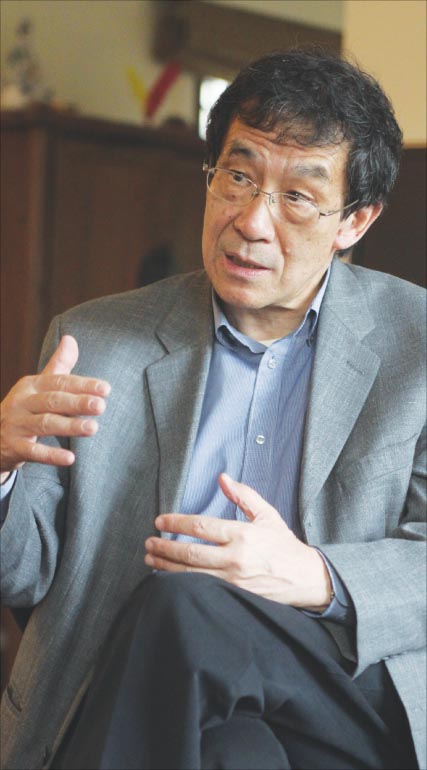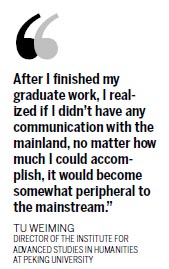Life and Leisure
The thinking that's guided a Confucian scholar
By Eric Jou (China Daily)
Updated: 2010-09-27 17:07
 |
Large Medium Small |

BEIJING - Searching the truth and adhering to The Analects, that is the way of a Confucian thinker. No one better fits this better than Harvard professor Tu Weiming, and that is why he is heading the new Institute for Advanced Studies in Humanities at Peking University in Beijing.
Tu, who is often called a New Confucian, believes the term is wrong and calls himself a third-generation Confucian scholar.
"I don't like the term 'new', because when you put it in the temporal," Tu said. "Before you know it, there will be new, new Confucianism, or post-modern Confucianism."
Tu was born in Kunming, Yunnan province, in Southwest China. He left for Taiwan with his family during the World War II and discovered his passion for Confucian teachings after he settled in Taiwan.
Forgoing a chance to enroll at the prestigious Taida, or National Taiwan University, in Taipei, Tu ended at Tunghai University in Taichung, in central Taiwan.
"My major was Chinese philosophy with an emphasis on Confucian tradition - I began interested in that when I was pretty young," he said.
"The reason why I didn't go to Taida but to Tunghai was because two to three major Confucian scholars were at Tunghai."
Tu had his primary and undergraduate education in Taiwan before he went to the United States to obtain his master's and PhD at Harvard University.
It wasn't until after he completed his graduate and postgraduate work that he returned to the mainland.
"After I finished my graduate work, I realized if I didn't have any communication with the mainland, no matter how much I could accomplish, it would become somewhat peripheral to the mainstream," Tu said.
In 1978, Tu got his wish. Returning to the mainland for the first time since a child, Tu participated in a meeting of oceanographers, where he gave a speech on the importance of maritime exploration, in particular, the significance of the Zheng He explorations. Zheng became famous as a Chinese navigator during the Ming Dynasty (1368-1644).
 Eventually as China opened up, Tu was invited to become a guest lecturer at Peking University in Beijing, and taught the same class that Liang Shuming, a great Chinese philosopher, had done so in 1923.
Eventually as China opened up, Tu was invited to become a guest lecturer at Peking University in Beijing, and taught the same class that Liang Shuming, a great Chinese philosopher, had done so in 1923.
Since 1985 there has been a major change to the reception of Confucianism, Tu said.
From the time when he first returned to China from the US there was a great deal of curiosity; some people studied it as a scholarly subject like history and philosophy. But Tu said there is a sense that what is important and meaningful in the Confucius tradition has been lost and misunderstood.
"Someone told me that no one in our generation can identify with the Confucius tradition," Tu said. "Of course I identify with the traditions."
While teaching Confucian traditions is an ideal job, his passion is putting the practice of the traditions to use. Citing the first phrase in The Analects, "It is pleasant to learn with a constant perseverance and application", Tu emulates the spirit of Confucius, a spirit that is constantly learning.
But while Tu identifies with the traditions, he will not stubbornly adhere to it if it proves to be wrong.
Always traveling and learning, Tu is a beneficiary of dialogue - the dialogue between cultures, religions and ideologies.
For example, Tu is striving to get a "peaceful dialogue" in the differences between Christian and Buddhist beliefs. The Buddhist and the Christian languages are incompatible, so that's why peaceful dialogue is necessary, he said.
"I respect you; you respect me; I don't want you to change. That's communication," Tu said.
"You have to become human before you become a Christian or a Buddhist."
Although a Confucian scholar, Tu adheres to a very enlightened personal philosophy.
Should Confucianism become outdated and its traditions no longer truthful, beautiful or good, he would learn what he can from the good and move on, rather than denounce or reject the traditions outright.
Tu is more than just a professor, and more than just a simple philosopher.
He is an adventurer on the great journey that is life, seeking to find what is important to him - truth.
"I'm not an armchair philosopher," he said.
"I want to be engaged, politically concerned and socially engaged. I travel and debate. I'm a beneficiary of dialogue."
China Daily